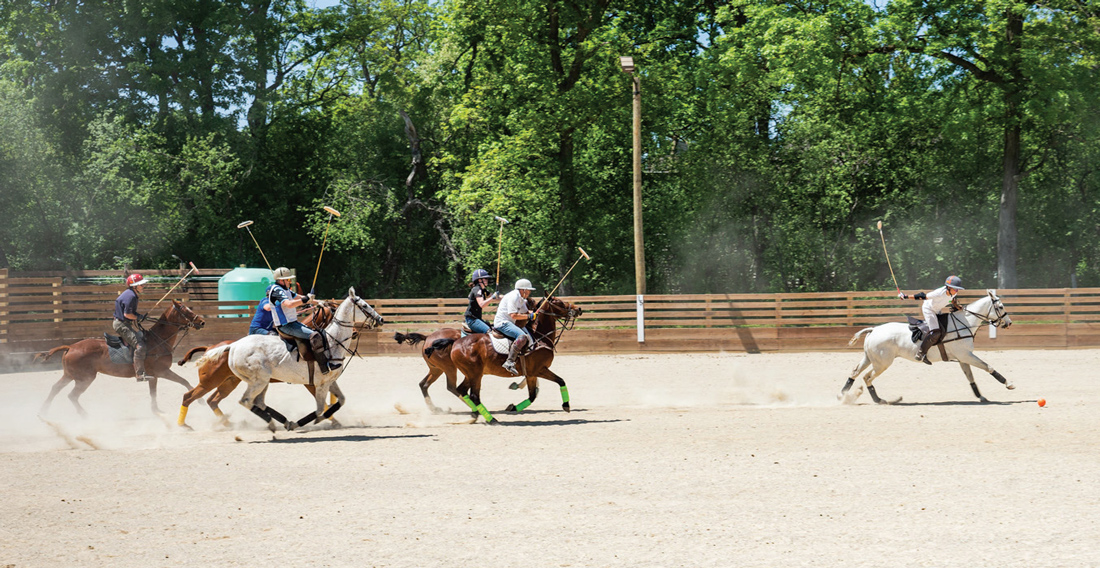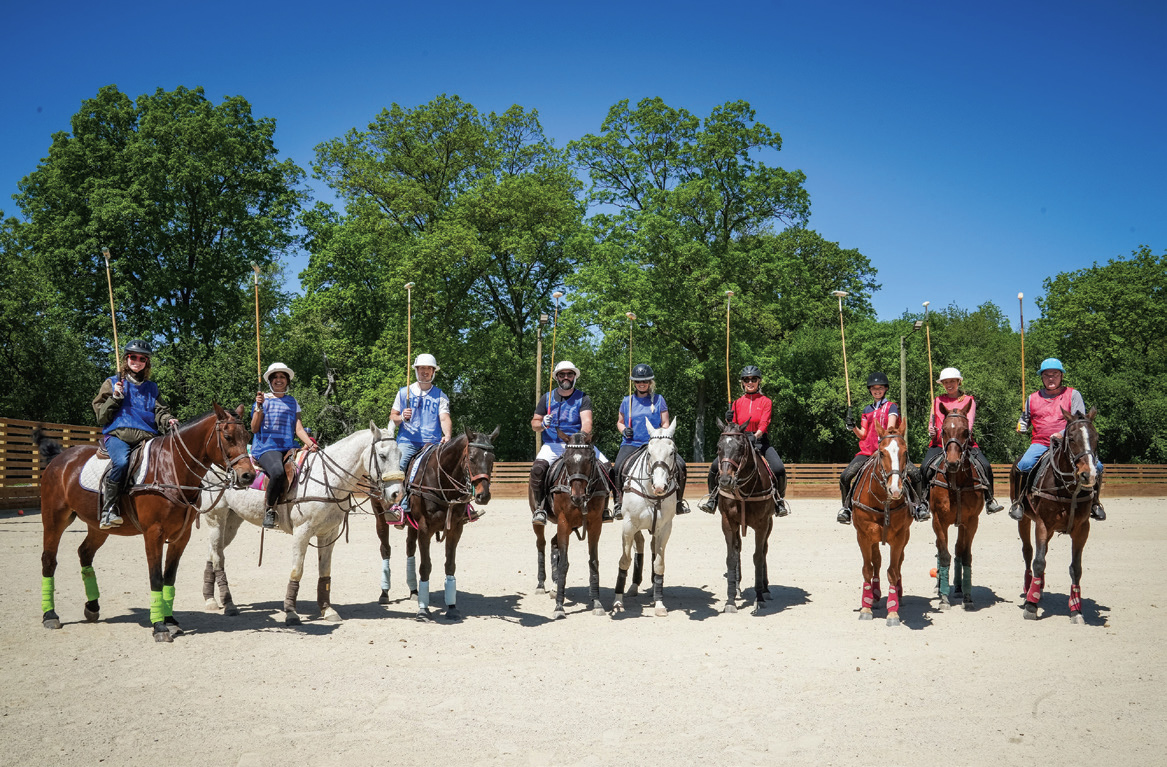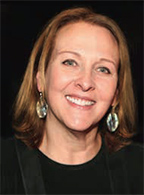

When John Rosene was a boy of 9 years old, his mother signed him up for a horse-riding lesson at the Starlight Stable in Skokie. It was something to keep him busy, not a family tradition. He joined other children from his neighborhood on the bus ride over but didn’t make it to the trail ride. “When they put me on the horse, I was so scared that I got off and stayed at the barn while the other kids rode off,” Rosene said.
A few years later, the Rogers Park native attended a summer riding school at the Northwestern Stables in Morton Grove, now called Freedom Woods. Rosene started at the beginner’s level with the five-day-a-week program where each student learned how to saddle, ride, and hose down the horse, then letting their horse graze while holding its lead line. At 14, he took a job at the same barn where he learned to ride, having 21 horses in his daily care. Feeding, watering, and cleaning the tack and stalls was compensated with two dollars a day—and all the riding he could get in.
At 16, with his driver’s license and a car, Rosene took a job at the same barn for $200 a month and did that for a couple of years before college. “Very few boys stuck with horse riding by that age, so besides being able to ride as much as I could, all the girls were the attraction,” he said with his classic sense of humor.
Rosene bought his first horse during his college years during a gap year in Texas. Having returned to Northwestern University, he met his future wife, Karen, who he intended to impress with his horse-riding skills in a PE class. The two finished school in 1962, and married two years later. They each bought a horse and found an old dairy barn, through some friends, for boarding.
A central figure in Rosene’s introduction to polo is Jim McGahan. “My dad was a sub-developer in Buffalo Grove, and there was an old dairy barn on some land he was working near,” Rosene said. “He told me there was a guy there, Jim McGahan, who kept his horses in the barn, and that I might be able to do the same.” McGahan invited Rosene to play some limited polo with him in Lake Forest for a modest fee and while his horse wasn’t exactly suitable, he continued to play there. But a few years into the sport, life took over. By 1967, he realized that with a career, marriage, and wanting to buy a house and have children (he and Karen have two who live near Barrington), that they’d have to put off their equestrian pursuits. Rosene would return to polo in 1989 as an avocation that he is passionate about and deeply committed to after a long break from it.
Anyone who knows the Barrington Hills Polo Club, its school, and Rosene—its longtime leader—can detect the constantly insightful, strategic, and creative effort it has taken to build the program and keep it strong. As the creative and marketing director for the ad agency he co-owned in Chicago, Rosene’s advertising work and reputation lived on the top ten ranking list for Chicago agencies for years—right next to J. Walter Thompson and Leo Burnett. “We worked with Sportmart and every major furniture outlet including Nelson Brothers,” he said. Their clients included Mattel, Al Piemonte Ford, and Weil Cadillac. “We learned how to make inexpensive TV commercials and were filming every week of the year.”

Years later, the man with the colorful personality, Jim McGahan, went from odd jobs to making it big with an adhesives product he invented for the needlepoint craze of the 1980s. With his newfound fortune, McGahan bought Lakewood Acres in Wauconda where the Rosenes could ride every day—and they did. “Jim let me ride any horse I wanted. He did this with many people. He was a polo evangelist. I cannot say enough good things about him,” Rosene said.
The Lakewood Acres Polo Club of 1990 is today’s Barrington Hills Polo Club’s arena, used for the polo school and scrimmages. At the time, Rosene realized that growing the club was a zero-sum game—that if they wanted new players, they would have to attract them away from other clubs. To Rosene, that didn’t seem sustainable. And at a point where the club’s membership dwindled to six members, Rosene was asked to take over as president by Les Baddeley, to harness his creative strength to rebuild their numbers long term.
So, he had the idea to open a polo school, to train new players, to grow their own. “We were not in the business to sell polo lessons,” Rosene said. “The polo school was and is a recruitment tool for the club, and anyone who wanted to attend the school would have to join the club. Back then, it was $600 (now $800) which entitles you to an unlimited amount of playing polo for a year.” The late Les Baddeley was the club’s first president, and he modeled the school’s training after a polo clinic he attended in Palm Beach—one Rosene would also attend. Club members shared their horses with the polo school. “That foundation we created in 1990 has largely remained unchanged in 30 plus years,” Rosene said.
A three-line ad in the “Horses, Harness, and Tack” section of the Chicago Tribune classifieds section read: If you can sit on a horse, you can learn to play polo. We provide the horse. Included was Rosene’s phone number. It was an immediate success for the club. “Since that ad in 1990, we have never looked back,” Rosene said.
The secret of the Spring Polo School’s success is the focus on a few fundamentals over and over—so much so that if someone misses a class, they won’t miss much. Rosene felt that the polo clinic he took in Palm Beach would be too overwhelming for beginners, so his format was set and hasn’t changed it since the school began.
“We take people who have never been on a horse before and we will literally have them playing polo on their first lesson. We run the school for about six weeks at Lakewood in Wauconda, and then move to the grass fields in early June,” Rosene said. The club has recently started a Friday night league to keep new members engaged in the sport.
Polo is just a hobby for normal working folks says accomplished amateur polo player Megan West. “Yes, horses can be costly,” West said. “But all you need is to own or share-board a horse and you can play polo with us. We’ll help you figure out the rest. Everyone thinks polo is out of reach or is an elitist avocation,” West explains. “However, if you are willing to work for it, playing polo is attainable. It’s more within your grasp than you might think.” West exhibits the same come-as-you-are philosophy as that of her Barrington Hills Polo Club mentor and friend, John Rosene. They de-mystify polo and even purport that people who haven’t been on a horse before can learn how to play.
The Barrington Hills Polo Club’s Spring Polo School is nationally recognized by the United States Polo Association, which also provides financial support and referees for official competitions. In turn the club, and all its members, belong to the association.
With its 30-plus year history, the Barrington Hills Polo Club members have become a family, says Rosene. “We’ve had weddings, funerals, children born to club members, and many parent’s children play alongside them,” he said. Club members often gather for cookouts or parties after a match or scrimmage.
For the once little boy who was afraid to sit on a horse, John Rosene has devoted much of his adult life to horses, growing a sustainable polo club, and making polo fun and accessible to people. Now in his eighties, Rosene can look back at his great success of multi-generational polo playing families. And for him?
“I intend to play polo forever,” he said. “There is no end in sight.”
 Lisa Stamos is the founder of Quintessential Media Group and the publisher of Quintessential Barrington magazine. She may be reached at lisa@qbarrington.com.
Lisa Stamos is the founder of Quintessential Media Group and the publisher of Quintessential Barrington magazine. She may be reached at lisa@qbarrington.com.



Share this Story